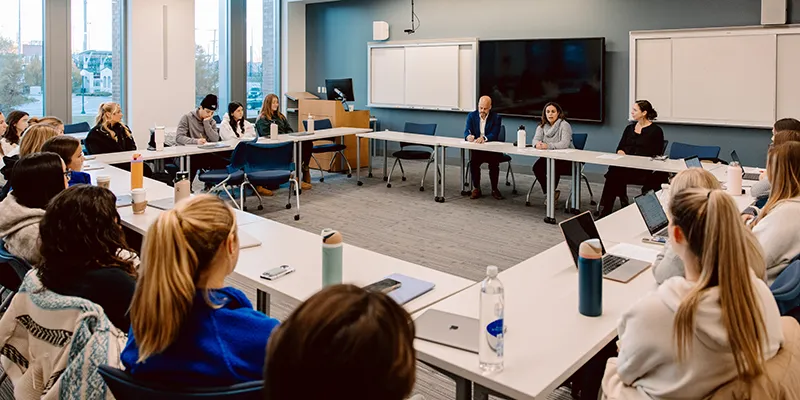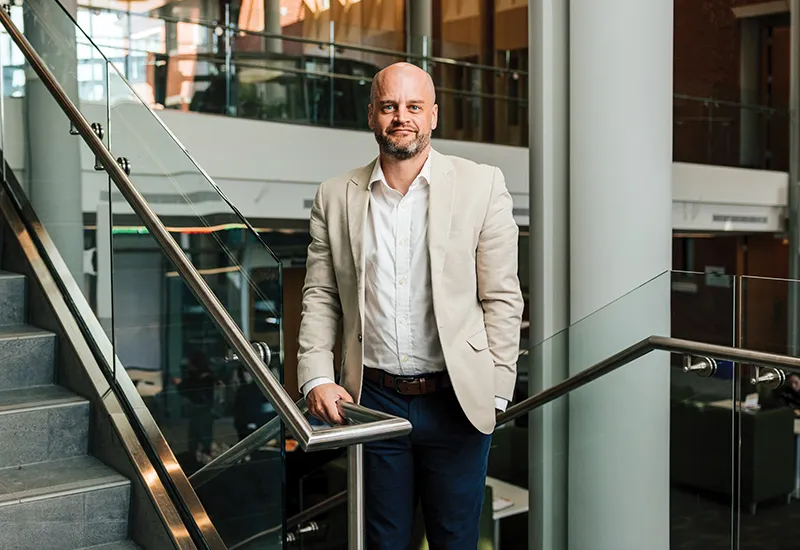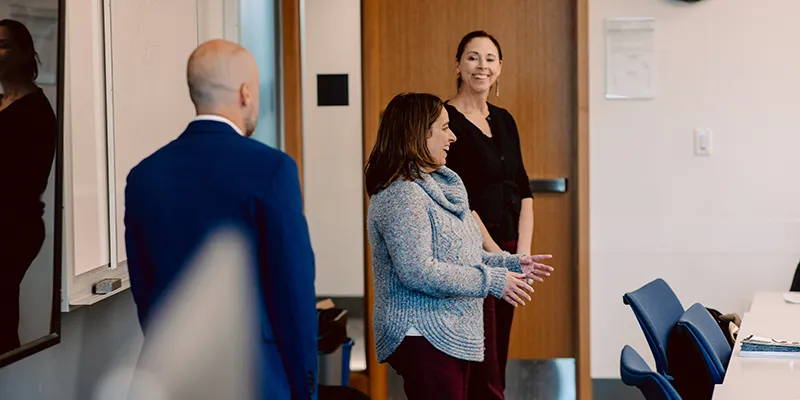April 08, 2025
Consumer Well-Being course inspires marketing students to reflect on what it means to live well
By Michael Hagan ’15, ’19G
Marketers and scholars study trends in wellness products and lifestyle brands. Students in a Consumer Well-Being course taught by Kevin Newman, Ph.D., associate professor of marketing, studied well-being itself.
“Students said they’ve been wanting a course like this,” Newman said. “When learning the skills and methods of marketing and other business studies, there’s a risk of losing sight of the fundamental question: What is business for?”

For Newman, the answer goes beyond profit, economic development, and innovation. Business is shared enterprise, the workplace is a community, and commerce is an expression of consumers’ values and aspirations. When business leaders lose sight of this, people can suffer.
“A lot of business research today is taking a hard look at the responsibility marketers and managers play in an alarming drop in indicators of happiness, especially among young people. People younger than 30 are demonstrably unhappy on average,” Newman said, citing the World Happiness Report, an annual study conducted in partnership with Gallup, the Oxford Wellbeing Research Centre, and the UN Sustainable Development Solutions Network.
A key question undergirding the World Happiness Report and similar studies is among the questions PC students investigate in Development of Western Civilization courses, philosophy, and other core disciplines from the moment they arrive on campus: What does it mean to live and be well? This was the starting point for Newman’s course, offered in the Fall 2024 semester.
Students considered sources ancient and modern; movements in philosophy, religion, and psychology; and thinkers including Plato, Aristotle, Confucius, Laozi, and William James. They considered points of emphasis and possible gaps in definitions of well-being from the Merriam-Webster Dictionary, the Centers for Disease Control and Prevention, and the National Institutes of Health.
They examined the claims of businesses whose products and services promise happiness to consumers. They considered the phenomenon of “toxic positivity” and the ways that social and other media promote an artificial happiness and illusory satisfaction. They asked, “Are happiness and fulfilment the same thing?”
The global wellness market —which includes products and services oriented toward fitness, nutrition, body image, mindfulness, and relaxation — accounts for an estimated $1.5 trillion in global economic activity. With five-to-10 per cent growth each year, that value increases rapidly. Business students need to understand how this economic sector operates, but PC students, who are committed to pursuit of deeper meaning, must understand more than profits, Newman believes.
“When professors put together our dossiers, we are asked to demonstrate how we align our teaching to the college’s mission. Sometimes students perceive a separation of business studies from the goals of liberal arts education,” Newman said.

Newman’s undergraduate studies in psychology led to him to study consumer behavior in graduate school. He believes the connections between the liberal arts and business studies are observable and that business courses, and all courses taught at PC, ought to align with the liberatory, ethical, and humanistic principles at the core of liberal arts education.
In the Consumer Well-Being course, more than 15 guests from the campus and alumni communities discussed these principles and their practical applications directly. For many students, the format was surprising.
“I’ve never had a course organized like this,” said Cooper Kinnaly ’26, a marketing major from Hampton Falls, New Hampshire. “Two-and-a-half hour meetings once a week, student-facilitated conversations with expert guests, out-of-class work that helped me build wellness habits and balance — it was different, and it is important.”
Kinnaly is fascinated by the psychology in marketing. He enjoys the challenge of understanding the ways others think and the innovative approaches to research and marketing practice encouraged by his professors. Newman’s course challenged students to turn that curiosity and creativity inward — and to share their findings with their peers.
I’ve never had a course organized like this.
Cooper Kinnaly ’26
The course focused on seven aspects of wellness — called “life domains” — identified by practitioners of positive psychology. Positive psychologists study the factors that contribute to a fulfilling and meaningful life. Small groups of students focused on a single life domain — including occupational, social, environmental, spiritual, financial, physical, and emotional well-being — to facilitate the weekly course meeting.
When Kinnaly received his group’s assignment— spiritual well-being — he worried, because he does not consider himself a religious person. His preparations revealed spiritual well-being to be more capacious than he imagined. Rev. Simon Teller, O.P., college chaplain, was his session’s guest.
“Now I understand that wellness is more than being happy in the moment. It is about being fulfilled. Before this class, I’d say well-being is being happy with what you’re doing. Now I understand it’s about hope and the future as well,” Kinnaly said.
“If someone told me over the summer that I’d have to run a class for more than two hours in the fall, I wouldn’t have thought I could do it. But there was so much to talk about and to learn from others. The time flew,” he said.

Staff and alumni guests included Holli Mootz, RDN, campus registered dietitian, and staff from the Personal Counseling Center, director Rosemary Fernandes Mugan, Psy.D. ’98 and assistant director of substance use services Susan E. Ellingwood, LICSW.
“Kevin is bringing deeper meaning and consciousness into business education, and that is such important work,” said Jennifer Slater Scavina ’90, executive vice president and managing partner at EGR International Inc. “He is elevating the way students think about themselves, each other, and their careers.”
As a corporate leadership advisor and corporate leader, Scavina believes that employees and consumers perceive when messages are hollow and counterproductive.
“People know. They know if you are seeking to inspire or elevate them. They know if your branding and social responsibility initiatives are doing genuine good. Good management and corporate social responsibility are not smoke and mirrors. People want to believe in the companies and products they engage with,” Scavina said.
“If you are rooted in love, faith, and good priorities, things come together. It took me until my 40s to truly understand and practice balance. I’m inspired by the way Kevin’s students and other young people are talking about it. It’s a hopeful sign,” she said.
[Alumni] are here to help because we’ve experienced the value of this education and community and we know what Providence College students can bring into the world.
Jennifer Slater Scavina ’90
Scavina’s faith and spiritual practice were influenced by her PC education and the Dominican friars. She encourages people to view prayer and meditation as important to life and well-being as physical exercise is to the body.
“I told students that as with physical exercise, if you’re not actually praying or meditating, you won’t grow in these and experience the powerful results. That is a message of Jesus and of the world’s sacred faiths. You have to integrate prayer and spiritual practice into your life and the lives of those you love,” she said. “We are swimming in divinity, and we have to be able to release ourselves to God’s divine providence in every area of our lives.”
Scavina’s visit to Newman’s classroom left her excited to continue to engage with students and young alumni.
“Alumni are powerful conduits for student success. We are here to help because we’ve experienced the value of this education and community, and we know what Providence College students can bring into the world,” she said. “We are inspired by the experiences we’ve had here, and I believe much of that comes from openness to the Holy Spirit. That’s an openness we need to practice throughout our lives.”
The guest visits allowed Newman and his students to relate directly to people they might only experience from a distance or in the narrow context of professional life.
“I know the Dominican friars are real people like the rest of us, but when Father Simon came to speak with my students, I could really see, feel, and understand that in a new way,” Newman said.
Newman was moved by the willingness of students to be honest and to engage with course content. The depth and length of their response papers pleased him. They submitted weekly reflections as long as 3,000 words, reflecting about well-being and its importance to them as students, community members, and future business leaders.
He hopes to offer the course in the future with adjustments prompted by student enthusiasm and interest in taking more involved roles in planning and facilitation.
“I’ve never seen such vulnerability in students, such comfort talking about complicated and personal topics,” Newman said. “At times, I even started to tear up. This course rejuvenated me as an educator. It was a gift to be a part of.”
Imagine stepping into a classroom where every conversation challenges you, every lesson inspires you, and every professor sees your potential. Your gift through The Fund for Providence College brings passionate educators and boundary-pushing courses to life — keeping PC at the forefront of learning.





